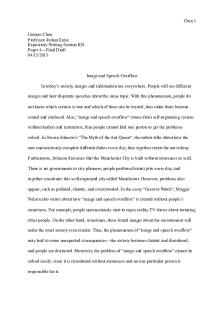English Final - Grade: B PDF

| Title | English Final - Grade: B |
|---|---|
| Author | Ella MacCallum |
| Course | Composition II |
| Institution | SUNY New Paltz |
| Pages | 3 |
| File Size | 56 KB |
| File Type | |
| Total Downloads | 84 |
| Total Views | 145 |
Summary
English final for david alfieri...
Description
Ella MacCallum ENG 180-22 Professor Alfieri English final- December 17th, 2018
The diploma vs. the degree: What college’s real purpose is Since I was 6, going to school and absorbing the knowledge that the teacher lay out for me every day was the norm. It was something that I never questioned. It was just part of my routine, as was doing homework and telling my mother what is was that I learned that day. You’d think that the process of moving up in education is chain-like, retaining and connecting information from previous years from kindergarten all the way up to the end of high school. However, and I think many would agree with me, I have no recollection of what I told my mother when she asked me what I learned in class at the dinner table. That may seem like a strange argument to make, but not only is it one made by me, it’s one made by Bryan Caplan, an economist who argues strongly against the case for more college students in the USA. The entire article that his opinions are featured in, called “The case against college”, informs the reader about the economic toll that college has on the country. The article centers around how college is really nothing but a more expensive continuation of high school, in which students retain “unnecessary and quickly forgotten” common knowledge. Caplin opens his case against college by bluntly stating the absurd amount of money that the United States spends on all levels of education per year. The author of the article states that Caplin’s doubts about education began when he was in kindergarten, and how, as he got older,
he put almost no effort into his work ethic and still was able to find success in all levels of education. On top of that, Caplin was able to secure a job at George Mason university, one of the toughest schools in the nation for high school students to get into. Caplan argues that human capital, or the attributes of value in the workplace, isn’t the main connection to education. In fact, he states in the article that he finds “no correlation between a country’s education level and its national income.” Even so, stats say that as of recently, those with a college education and a bachelor’s degree earn 73 percent more than those with a high school diploma. So is the bachelor’s degree sending out nothing but a message of superiority? Caplin seems to think that that might be a case, saying that those with college degrees get what he calls a “fat premium”. He presents ideas such as those with degrees could have been capable of earning more even without college, but that, on a job application, the degree, or diploma, as he calls it, stands out clearly against applications without it. The diploma shows initiative, patience, and superiority over those who weren’t “able” to sit through 4 more years of education after finishing high school. Earning that degree sends a message to potential bosses only if others don’t have that degree to present. When looking at another article, “Becoming a real person” by David Brooks, I realized that Brooks’ research on purpose brought forth points that Caplin could easily use to prove his own. About midway through the article, the idea of a “cognitive purpose” is brought up by Steven Pinker, a psychology professor at Harvard University. Pinker argues that the importance of college is for absorption of even more knowledge. Pinker claims that “Young people should know how to write clearly and reason statistically. They should acquire specific knowledge” (Brooks, 1). Pinker also claims that students who attend university should be chosen based on
prior knowledge seen on standardized tests such as the SAT. This ties nicely back to Caplin’s point that even if those students didn’t end up going to college, they still might be superior and intelligent enough to earn more than those who, if I can say this bluntly, aren’t seen that way. Another contributor to the article, William D, calls those students “excellent sheep” because, as he claims, college is a breeding ground for advancement. Those students “lust for prestige and fear..doing things that put status at risk..” (Brooks, 1). Caplin says similarly, saying that college, because the kids are seen as more intelligent if they are even capable of getting into college, is mostly about “jumping through hoops on command to show potential employers” that they are capable of doing so. Caplin’s entire argument, and the evidence suggested by Brooks’ article, shows that college is really nothing but the comparison, later in life, between the diploma from high school vs the degree from college. So is college really necessary if those kids attending college are intelligent enough to be seen as superior anyway? That’s something that everyone should take into consideration the next time that they sit down for yet another lecture full of useless information....
Similar Free PDFs

English Final - Grade: B
- 3 Pages

English - Grade: b+
- 6 Pages

English 1101P - Grade: B+
- 2 Pages

Final Paper - Grade: B+
- 4 Pages

Final draft - Grade: B
- 3 Pages

Final Essay - Grade: B+
- 12 Pages

ISSS final draft - Grade: b
- 14 Pages

Final essay 123 - Grade: B+
- 6 Pages

En2043 final essay - Grade: B
- 6 Pages

Paper 5 Final - Grade: B+
- 5 Pages

Eng 2800 Final - Grade: B
- 3 Pages

Paper 4 Final - Grade: B+
- 6 Pages

COM 2135 Final - Grade: B
- 1 Pages

CRA Final Draft - Grade: B+
- 4 Pages

English 0802 Paper #3 - Grade: B
- 7 Pages

ISP 334 Final Play - Grade: b
- 10 Pages
Popular Institutions
- Tinajero National High School - Annex
- Politeknik Caltex Riau
- Yokohama City University
- SGT University
- University of Al-Qadisiyah
- Divine Word College of Vigan
- Techniek College Rotterdam
- Universidade de Santiago
- Universiti Teknologi MARA Cawangan Johor Kampus Pasir Gudang
- Poltekkes Kemenkes Yogyakarta
- Baguio City National High School
- Colegio san marcos
- preparatoria uno
- Centro de Bachillerato Tecnológico Industrial y de Servicios No. 107
- Dalian Maritime University
- Quang Trung Secondary School
- Colegio Tecnológico en Informática
- Corporación Regional de Educación Superior
- Grupo CEDVA
- Dar Al Uloom University
- Centro de Estudios Preuniversitarios de la Universidad Nacional de Ingeniería
- 上智大学
- Aakash International School, Nuna Majara
- San Felipe Neri Catholic School
- Kang Chiao International School - New Taipei City
- Misamis Occidental National High School
- Institución Educativa Escuela Normal Juan Ladrilleros
- Kolehiyo ng Pantukan
- Batanes State College
- Instituto Continental
- Sekolah Menengah Kejuruan Kesehatan Kaltara (Tarakan)
- Colegio de La Inmaculada Concepcion - Cebu